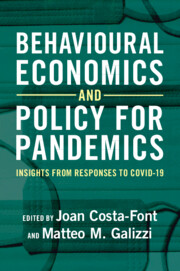Book contents
- Behavioural Economics and Policy for Pandemics
- Behavioural Economics and Policy for Pandemics
- Copyright page
- Epigraph
- Contents
- Contributors
- Preface
- Acknowledgements
- 1 Behavioural Economics and Policy for Pandemics
- Part I Evidence from Experiments and Behavioural Insights
- 2 What Have We Learned from Behavioural Economics for the COVID-19 Response?
- 3 Adaptation, COVID-19, and Climate Change
- 4 Risk-Taking, Risk Perception, and Risk Compensation in Times of COVID-19
- 5 A False Sense of Security?
- 6 Preparing for the Next Pandemic
- 7 Human Challenge Trials for Research on COVID-19 and Beyond
- 8 Do the Public Support ‘Hard’ or ‘Soft’ Public Policies?
- 9 One Size Does Not Fit All
- 10 Psychological and Behavioural Aspects of the COVID-19 Pandemic
- 11 Behavioural Science and the Irish COVID-19 Response
- 12 On the Use of Behavioural Science in a Pandemic
- 13 Behavioural Public Health?
- Part II Health Behaviours and Policies during Covid-19
- Index
- References
7 - Human Challenge Trials for Research on COVID-19 and Beyond
The Case of 1Day Sooner
from Part I - Evidence from Experiments and Behavioural Insights
Published online by Cambridge University Press: 31 January 2025
- Behavioural Economics and Policy for Pandemics
- Behavioural Economics and Policy for Pandemics
- Copyright page
- Epigraph
- Contents
- Contributors
- Preface
- Acknowledgements
- 1 Behavioural Economics and Policy for Pandemics
- Part I Evidence from Experiments and Behavioural Insights
- 2 What Have We Learned from Behavioural Economics for the COVID-19 Response?
- 3 Adaptation, COVID-19, and Climate Change
- 4 Risk-Taking, Risk Perception, and Risk Compensation in Times of COVID-19
- 5 A False Sense of Security?
- 6 Preparing for the Next Pandemic
- 7 Human Challenge Trials for Research on COVID-19 and Beyond
- 8 Do the Public Support ‘Hard’ or ‘Soft’ Public Policies?
- 9 One Size Does Not Fit All
- 10 Psychological and Behavioural Aspects of the COVID-19 Pandemic
- 11 Behavioural Science and the Irish COVID-19 Response
- 12 On the Use of Behavioural Science in a Pandemic
- 13 Behavioural Public Health?
- Part II Health Behaviours and Policies during Covid-19
- Index
- References
Summary
Human challenge trials are trials in which volunteers are intentionally exposed to infectious disease-causing organisms for the purpose of testing novel vaccines or treatments, as well as to study the progression of the disease in a controlled environment. The practice of systematically infecting individuals with pathogens of interest has been recorded since the eighteenth century, although in most cases these infections did not meet the ethical standards that are in place today. With the rise of modern research ethics in the 1970s and the wider implementation of these standards by the 1980s, HCTs that have been conducted more recently have been used to safely study a wide variety of pathogens and speed up the development of vaccines for typhoid and cholera. Despite this historical precedent, the idea of conducting an HCT with SARS-CoV-2 (the causative agent of COVID-19) faced ethical and practical challenges, including the lack of any known rescue treatment for the disease and uncertainty around the potential long-term effects that volunteers exposed to the pathogen might someday experience. This chapter presents the research of 1Day sooner around the development of HCTs in the context of the COVID-19 pandemic and discusses how these findings may be relevant to pandemic preparedness efforts in the future.
- Type
- Chapter
- Information
- Behavioural Economics and Policy for PandemicsInsights from Responses to COVID-19, pp. 114 - 125Publisher: Cambridge University PressPrint publication year: 2024

